AWM41 1072 - [Official History, 1914-18 War: Records of Arthur G Butler:] Interviews containing accounts of Nursing experiences in the AANS [Australian Army Nursing Service]. These nurses were interviewed by Matron Kellett - Part 17
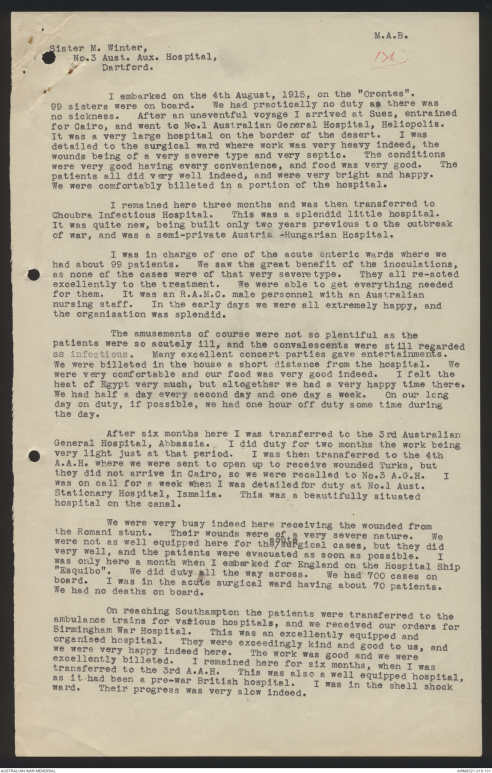
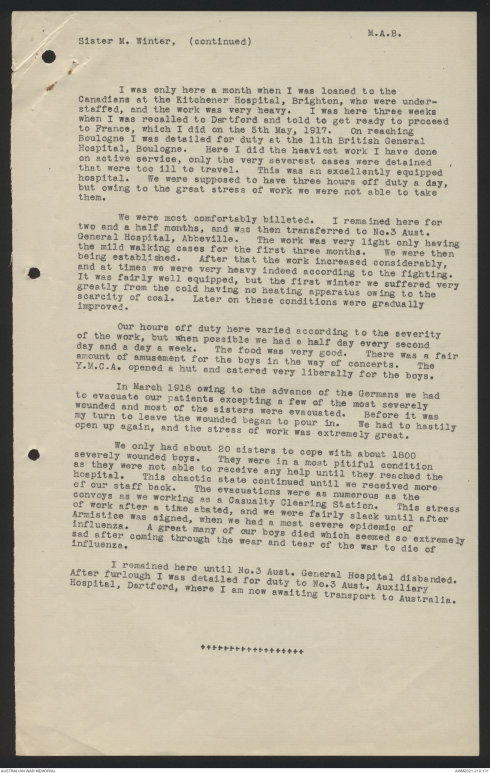
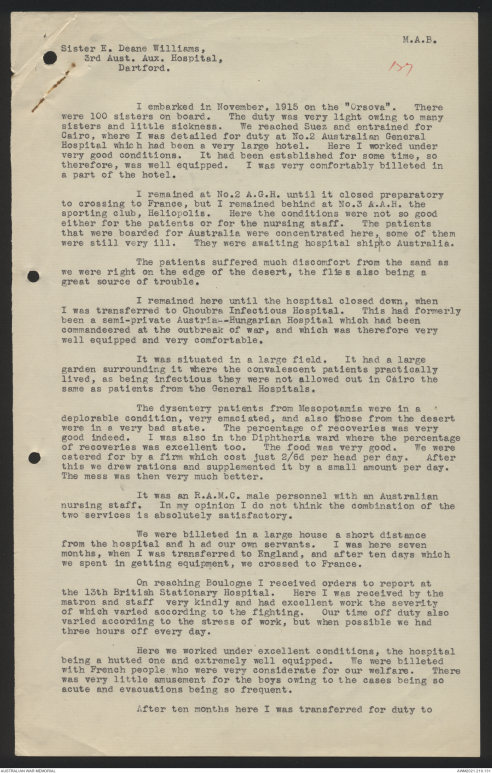
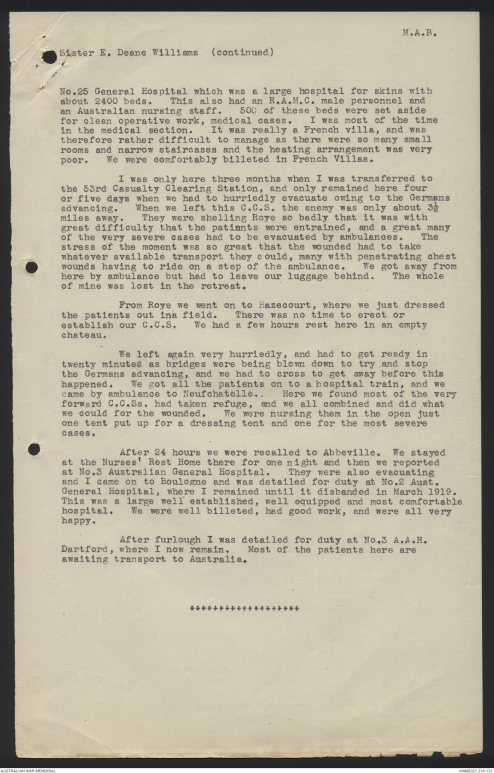
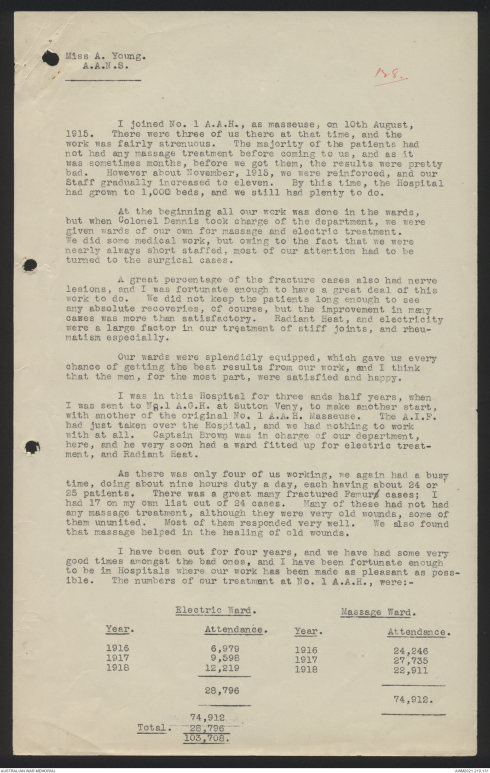
M.A.B
[*126*]
Sister M. Winter,
No.3 Aust. Aux. Hospital,
Dartford.
I embarked on the 4th August, 1915, on the "Crontes".
99 sisters were on board. We had practically no duty as there was
no sickness. After an uneventful voyage I arrived at Suez, entrained
for Cairo, and went to No.1 Australian General Hospital, Heliopolis.
It was a very large hospital on the border of the desert. I was
detailed to the surgical ward where work was very heavy indeed, the
wounds being of a very severe type and very septic. The conditions
were very good having every convenience, and food was very good. The
patients all did very well indeed, and were very bright and happy.
We were comfortably billeted in a portion of the hospital.
I remained here three months and was then transferred to
Choubra Infectious Hospital. This was a splendid little hospital.
It was quite new, being built only two years previous to the outbreak
of war, and was a semi-private Austrian-Hungarian Hospital.
I was in charge of one of the acute enteric wards where we
had about 99 patients. We saw the great benefit of the inoculations,
as none of the cases were of that very severe type. They all re-acted
excellently to the treatment. We were able to get everything needed
for them. It was an R.A.M.C. male personnel with an Australian
nursing staff. In the early days we were all extremely happy, and
the organisation was splendid.
The amusements of course were not so plentiful as the
patients were so acutely ill, and the convalescents were still regarded
as infectious. Many excellent concert parties gave entertainments.
We were billeted in the house a short distance from the hospital. We
were very comfortable and our food was very good indeed. I felt the
heat of Egypt very much, but altogether we had a very happy time there.
We had half a day every second day and one day a week. On our long
day on duty, if possible, we had one hour off duty some time during
the day.
After six months here I was transferred to the 3rd Australian
General Hospital, Abbassia. I did duty for two months the work being
very light just at the period. I was then transferred to the 4th
A.A.H. where we were sent to open up to receive wounded Turks, but
they did not arrive in Cairo, so we were recalled to No.3 A.G.H. I
was on call for a week when I was detailed for duty at No.1 Aust.
Stationary Hospital, Ismalia. This was a beautifully situated
hospital on the canal.
We were very busy indeed here receiving the wounded from
the Romani stunt. Their wounds were of a very serious nature. We
were not as well equipped here for the ^acute surgical cases, but they did
very well, and the patients were evacuated as soon as possible. I
was only here a month when I embarked for England on the Hospital Ship
"Esquibo". We did duty all the way across. We had 700 cases on
board. I was in the acute surgical ward having about 70 patients.
We had no deaths on board.
On reaching Southampton the patients were transferred to the
ambulance trains for various hospitals, and we received our orders for
Birmingham War Hospital. This was an excellently equipped and
organised hospital. They were exceedingly kind and good to us, and
we were very happy indeed here. The work was good and we were
excellently billeted. I remained here for six months, when I was
transferred to the 3rd A.A.H. This was also a well equipped hospital,
as it had been a pre-war British hospital. I was in the shell shock
ward. Their progress was very slow indeed.
M.A.B.
Sister M. Winter, (continued)
I was only here a month when I was loaned to the
Canadians at the Kitchener Hospital, Brighton, who were under-staffed,
and the work was very heavy. I was here three weeks
when I was recalled to Dartford and told to get ready to proceed
to France, which I did on the 5th May, 1917. On reaching
Boulogne I was detailed for duty at the 11th British General
Hospital, Boulogne. Here I did the heaviest work I have done
on active service, only the very severest cases were detained
that were too ill to travel. This was an excellently equipped
hospital. We were supposed to have three hours off duty a day,
but owing to the great stress of work we were not able to take
them.
We were most comfortably billeted. I remained here for
two and a half months, and was then transferred to No.3 Aust.
General Hospital, Abbeville. The work was very light only having
the mild walking cases for the first three months. We were then
being established. After that the work increased considerably,
and at times we were very heavy indeed according to the fighting.
It was fairly well equipped, but the first winter we suffered very
greatly from the cold having no heating apparatus owing to the
scarcity of coal. Later on these conditions were gradually
improved.
Our hours off duty here varied according to the severity
of the work, but when possible we had a half day every second
day and a day a week. The food was very good. There was a fair
amount of amusement for the boys in the way of concerts. The
Y.M.C.A. opened a hut and catered very liberally for the boys.
In March 1916 owing to the advance of the Germans we had
to evacuate our patients excepting a few of the most severely
wounded and most of the sisters were evacuated. Before it was
my turn to leave the wounded began to pour in. We had to hastily
open up again, and the stress of work was extremely great.
We only had about 20 sisters to cope with about 1800
severely wounded boys. They were in a most pitiful condition
as they were not able to receive any help until they reached the
hospital. This chaotic state continued until we received more
of our staff back. The evacuations were as numerous as the
convoys as we working as a Casualty Clearing Station. This stress
of work after a time abated, and we were fairly slack until after
Armistice was signed, when we had a most severe epidemic of
influenza. A great many of our boys died which seemed so extremely
sad after coming through the wear and tear of the war to die of
influenza.
I remained here until No.3 Aust. General Hospital disbanded.
After furlough I was detailed for duty to No.3 Aust. Auxiliary
Hospital, Dartford, where I am now awaiting transport to Australia.
M.A.B.
[*127*]
Sister E. Deane Williams,
3rd Aust. Aux. Hospital,
Dartford.
I embarked in November, 1915 on the "Orsova". There
were 100 sisters on board. The duty was very light owing to many
sisters and little sickness. We reached Suez and entrained for
Cairo, where I was detailed for duty at No.2 Australian General
Hospital which had been a very large hotel. Here I worked under
very good conditions. It had been established for some time, so
therefore, was well equipped. I was very comfortably billeted in
a part of the hotel.
I remained at No.2 A.G.H. until it closed preparatory
to crossing to France, but I remained behind at No.3 A.A.H. the
sporting club, Heliopolis. Here the conditions were not so good
either for the patients or for the nursing staff. The patients
that were boarded for Australia were concentrated here, some of them
were still very ill. They were awaiting hospital ship to Australia.
The patients suffered much discomfort from the sand as
we were right on the edge of the desert, the flies also being a
great source of trouble.
I remained here until the hospital closed down, when
I was transferred to Choubra Infectious Hospital. This had formerly
been a semi-private Austrian-Hungarian Hospital which had been
commandeered at the outbreak of war, and which was therefore very
well equipped and very comfortable.
It was situated in a large field. It had a large
garden surrounding it where the convalescent patients practically
lived, as being infectious they were not allowed out in Cairo the
same as patients from the General Hospitals.
The dysentery patients from Mesopotamia were in a
deplorable condition, very emaciated, and also those from the desert
were in a very bad state. The percentage of recoveries was very
good indeed. I was in the Diphtheria ward where the percentage
of recoveries was excellent too. The food was very good. We were
catered for by a firm which cost just 2/6d per head per day. After
this we drew rations and supplemented it by a small amount per day.
The mess was then very much better.
It was an R.A.M.C. male personnel with an Australian
nursing staff. In my opinion I do not think the combination of the
two services is absolutely satisfactory.
We were billeted in a large house a short distance
from the hospital and had our own servants. I was here seven
months, when I was transferred to England, and after ten days which
we spent in getting equipment, we crossed to France.
On reaching Boulogne I received orders to report at
the 13th British Stationary Hospital. Here I was received by the
matron and staff very kindly and had excellent work the severity
of which varied according to the fighting. Our time off duty also
varied according to the stress of work, but when possible we had
three hours off every day.
Here we worked under excellent conditions, the hospital
being a hutted one and extremely well equipped. We were billeted
with French people who were very considerate for our welfare. There
was very little amusement for the boys owing to the cases being so
acute and evacuations being so frequent.
After ten months here I was transferred for duty to
M.A.B.
Sister E. Deane Williams (continued)
No.25 General Hospital which was a large hospital for skins with
about 2400 beds. This also had an R.A.M.C. male personnel and
an Australian nursing staff. 500 of these beds were set aside
for clean operative work, medical cases. I was most of the time
in the medical section. It was really a French villa, and was
therefore rather difficult to manage as there were so many small
rooms and narrow staircases and the heating arrangement was very
poor. We were comfortably billeted in French Villas.
I was only here three months when I was transferred to
the 53rd Casualty Clearing Station, and only remained here four
or five days when we had to hurriedly evacuate owing to the Germans
advancing. When we left this C.C.S. the enemy was only about 3½
miles away. They were shelling Roye so badly that it was with
great difficulty that the patients were entrained, and a great many
of the very severe cases had to be evacuated by ambulances. The
stress of the moment was so great that the wounded had to take
whatever available transport they could, many with penetrating chest
wounds having to ride on a step of the ambulance. We got away from
here by ambulance but had to leave our luggage behind. The whole
of mine was lost in the retreat.
From Roye we went on to Hazecourt, where we just dressed
the patients out ina field. There was no time to erect or
establish our C.C.S. We had a few hours rest here in an empty
chateau.
We left again very hurriedly, and had to get ready in
twenty minutes as bridges were being blown down to try and stop
the Germans advancing, and we had to cross to get away before this
happened. We got all the patients on to a hospital train, and we
came by ambulance to Neufchatelle. Here we found most of the very
forward C.C.Ss. had taken refuge, and we all combined and did what
we could for the wounded. We were nursing them in the open just
one tent put up for a dressing tent and one for the most severe
cases.
After 24 hours we were recalled to Abbeville. We stayed
at the Nurses' Rest Home there for one night and then we reported
at No.3 Australian General Hospital. They were also evacuating
and I came on to Boulogne and was detailed for duty at No.2 Aust.
General Hospital, where I remained until it disbanded in March 1919.
This was a large well established, well equipped and most comfortable
hospital. We were well billeted, had good work, and were all very
happy.
After furlough I was detailed for duty at No.3 A.A.H.
Dartford, where I now remain. Most of the patients here are
awaiting transport to Australia.
Miss A. Young.
A.A.N.S.
[*128.*]
I joined No. 1 A.A.H., as masseuse, on 10th August,
1915. There were three of us there at that time, and the
work was fairly strenuous. The majority of the patients had
not had any massage treatment before coming to us, and as it
was sometimes months, before we got them, the results were pretty
bad. However about November, 1915, we were reinforced, and our
Staff gradually increased to eleven. By this time, the Hospital
had grown to 1,000 beds, and we still had plenty to do.
At the beginning all our work was done in the wards,
but when Colonel Dennis took charge of the department, we were
given wards of our own for massage and electric treatment.
We did some medical work, but owing to the fact that we were
nearly always short staffed, most of our attention had to be
turned to the surgical cases.
A great percentage of the fracture cases also had nerve
lesions, and I was fortunate enough to have a great deal of this
work to do. We did not keep the patients long enough to see
any absolute recoveries, of course, but the improvement in many
cases was more than satisfactory. Radiant Heat, and electricity
were a large factor in our treatment of stiff joints, and rheumatism
especially.
Our wards were splendidly equipped, which gave us every
chance of getting the best results from our work, and I think
that the men, for the most part, were satisfied and happy.
I was in this Hospital for three ands half years, when
I was sent to No.1 A.G.H. at Sutton Veny, to make another start,
with another of the original No. 1 A.A.H. Masseuse. The A.I.F.
had just taken over the Hospital, and we had nothing to work
with at all. Captain Brown was in charge of our department,
here, and he very soon had a ward fitted up for electric treatment,
and Radiant Heat.
As there was only four of us working, we again had a busy
time, doing about nine hours duty a day, each having about 24 or
25 patients. There was a great many fractured Femurs cases; I
had 17 on my own list out of 24 cases. Many of these had not had
any massage treatment, although they were very old wounds, some of
them ununited. Most of them responded very well. We also found
that massage helped in the healing of old wounds.
I have been out for four years, and we have had some very
good times amongst the bad ones, and I have been fortunate enough
to be in Hospitals where our work has been made as pleasant as possible.
The numbers of our treatment at No. 1 A.A.H., were:-
Electric Ward. Massage Ward.
Year. Attendance. Year. Attendance.
1916 6,979 1916 24,246
1917 9,598 1917 27,735
1918 12,219 1918 22,911
28,796 74,912 .
74,912
Total. 26,796
103,708 .
 Sam scott
Sam scottThis transcription item is now locked to you for editing. To release the lock either Save your changes or Cancel.
This lock will be automatically released after 60 minutes of inactivity.